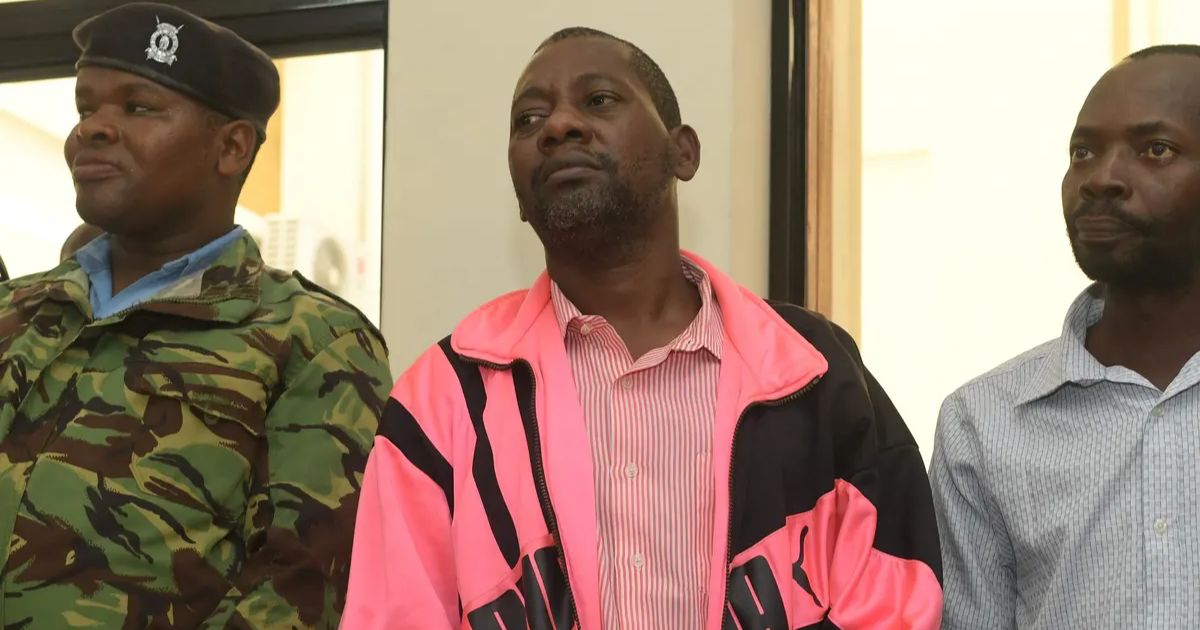Nation’s attention captured by a chilling case, allegedly doomsday cult leader who calls himself Pastor Paul Mackenzie is under intense scrutiny following his arrest in Kenya last April.
The arrest came after the discovery of mass graves containing the remains of 429 individuals, including children, with signs of starvation and possible assault.
Recent developments in the case have taken an unexpected turn as prosecutors prepare to charge Mackenzie and 94 others with murder, manslaughter, terrorism and torture.
The judge has ordered Mackenzie to undergo mental health checks before his indictment.
This decision was disclosed during a hearing in Malindi held recently stirring up public interest differing opinions.
Justice Mugure Thande granted the request from prosecution for more time to assess Mackenzie and 30 other suspects’ mental fitness to stand trial.
Appearing in pairs handcuffed together on Wednesday at court, only Mackenzie was standing alone.
During this period the judge allowed the evaluation process by the prosecution to continue for fourteen days so that they can report back to court on February 6.
World Shattering Discovery
This shocking realization was felt across Kenya and beyond its borders when mass graves were discovered in Shakahola, a remote forest west of Malindi in April 2023.
The bodies of 429 people including children were exhumed most showing signs of malnutrition.
This gruesome finding put Mackenzie and his Good News International Church members under fire prompting many people to question whether justice is taking its course.
Allegations against Cult Leader’s Influences
Mackenzie denies being responsible for their deaths, but he is charged with leading his followers into that remote place for an apocalyptic event.
Witnesses claim that Mackenzie encouraged his church members to relocate and engage in fasting allegedly because end times were near.
The charges range from murder through genocide which resulted from actions of Mackenzie as claimed by the prosecution.
Mackenzie’s Defense Strategies & Legal Hurdles
Consequently, Mackenzie argues that he cannot be held liable for the deaths since his church was closed in 2019.
The cult leader’s advocate also disclosed that Mackenzie had been sentenced to 12months imprisonment in November last year for producing and distributing films without a license.
Mackenzie plans to go on appeal to challenge this judgement. In addition, Mackenzie’s case together with other co-accused is facing additional charges of terrorism taking place in Mombasa, the coastal county.
Holds-Ups and Public Concerns
Many Kenyans and international observers are confused by the pace of the case which seems slow considering its gravity and huge loss of lives.
On top of this, mental health evaluations have further complicated legal proceedings, raising worries about potentially derailing justice for victims and their families alike.
Global attention
The international community has been shocked by the arrest of the cult leader and subsequent legal processes.
The situation exposes how easily misguided people can fall under manipulative influences of charismatic leaders.
Kenya now grapples with a shocking revelation that has not only shattered communities but also raised concerns over religious organizations’ vigilance against possible abuses of power as the world watches on.
Mental Health Evaluation: Is it a Legal Precedent?
The choice to submit Mackenzie and other suspects to psychiatric evaluations before charges are preferred may establish a legal precedent.
The prosecution claims that this is necessary for a fair and unbiased trial while some critics are worried about delays and the feelings of victim’s families in waiting.
The mental assessment that is being done next week will be determinant as to how the trial will progress which will make the legal process more complicated.
Public Outcry and Calls for Reform
The public has been demanding reforms whose purpose is to prevent such like occurrences in future.
There is a debate about religious organizations’ monitoring mechanisms, in addition to the need for legislation aimed at protecting their members from manipulative acts.
Consequently, this case has sparked off an even bigger discussion about how freedom of worship should be balanced against preventing people from being brainwashed or harmed.
The Road Ahead
As proceedings in court continues, everyone anxiously watches over to see how fairness would be carried out in relation to a case that reveals dark side of rampant influence and abuse allegations within one religious community.
There is no doubt that these mental assessments will influence the course of the trial thus adding complexity in this already complicated case.
The following hearing on February 6 will give more information concerning what lies ahead for this high-profile case and if it will pave way towards controlling these religious institutions uncovered in Kenya and worldwide.





















